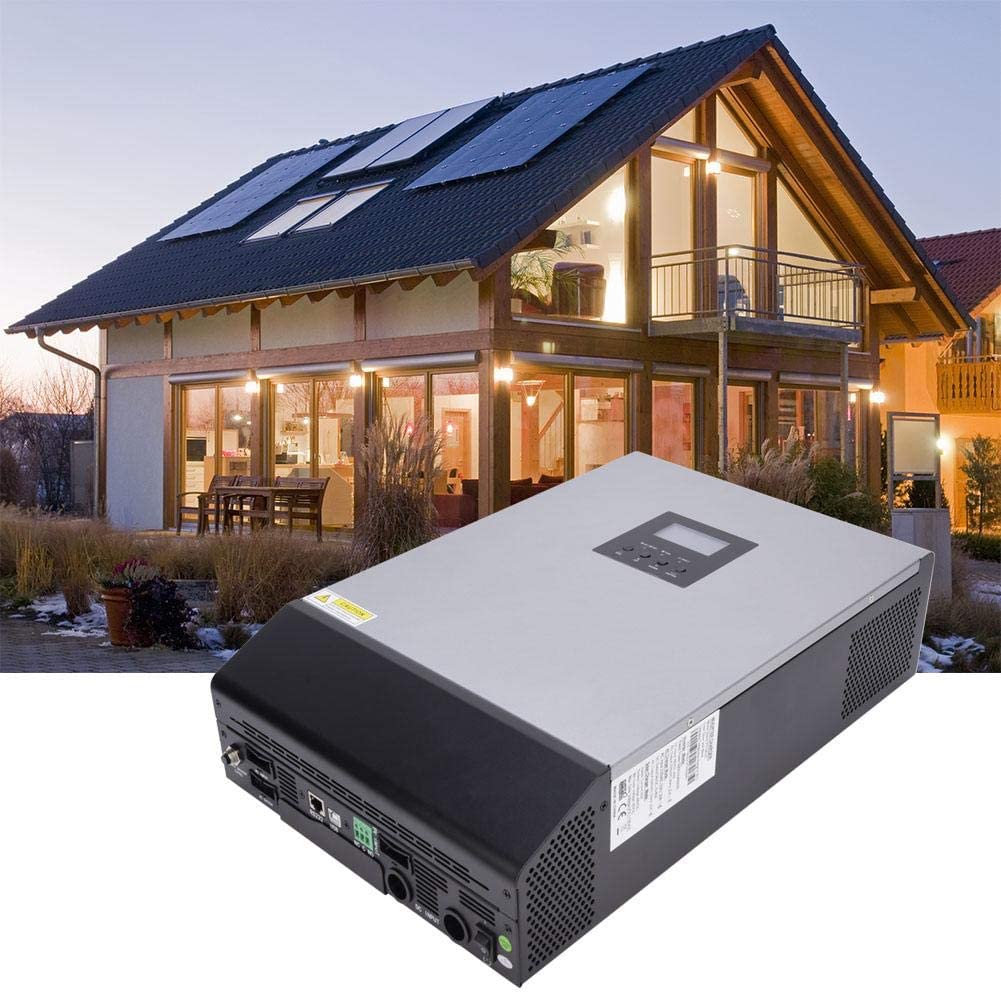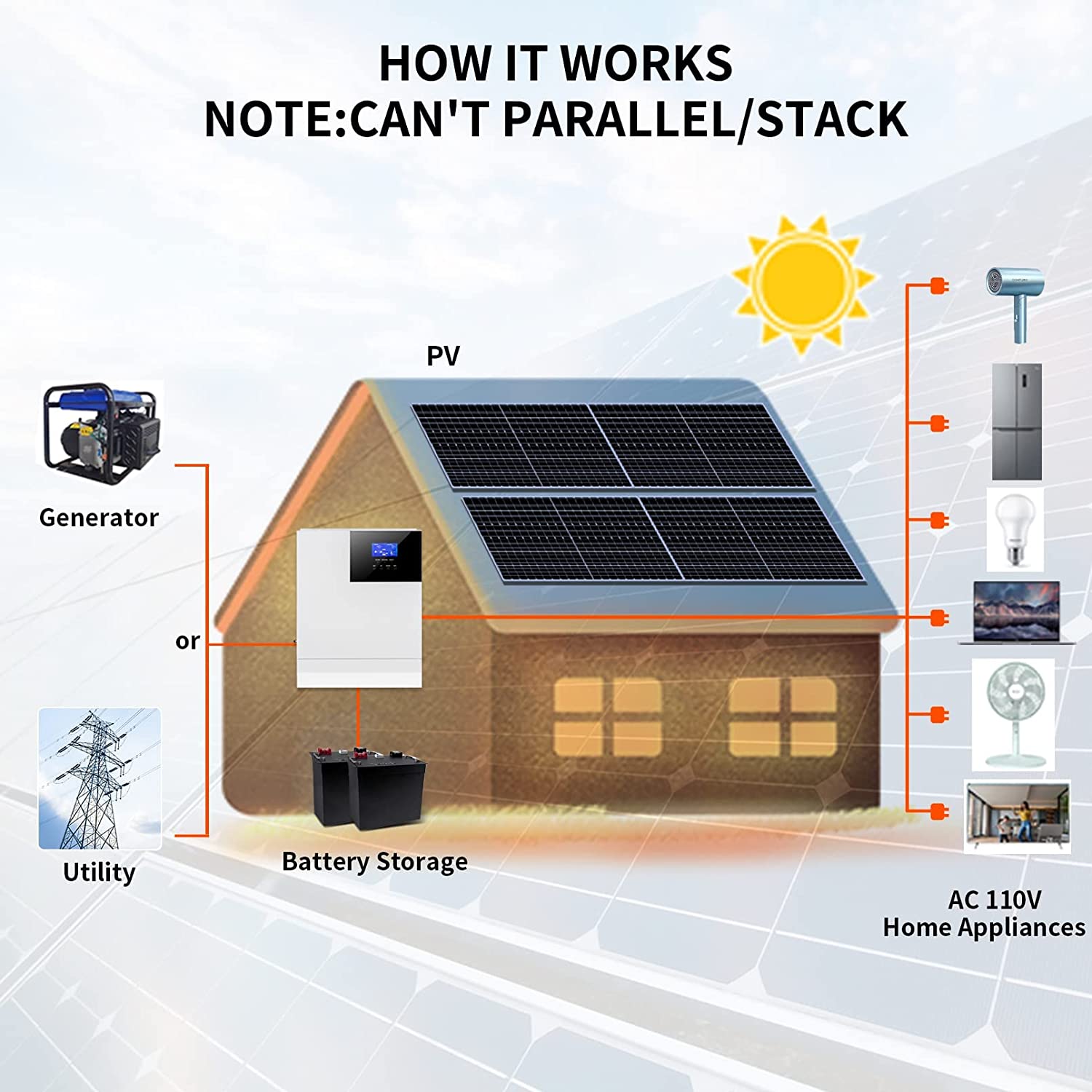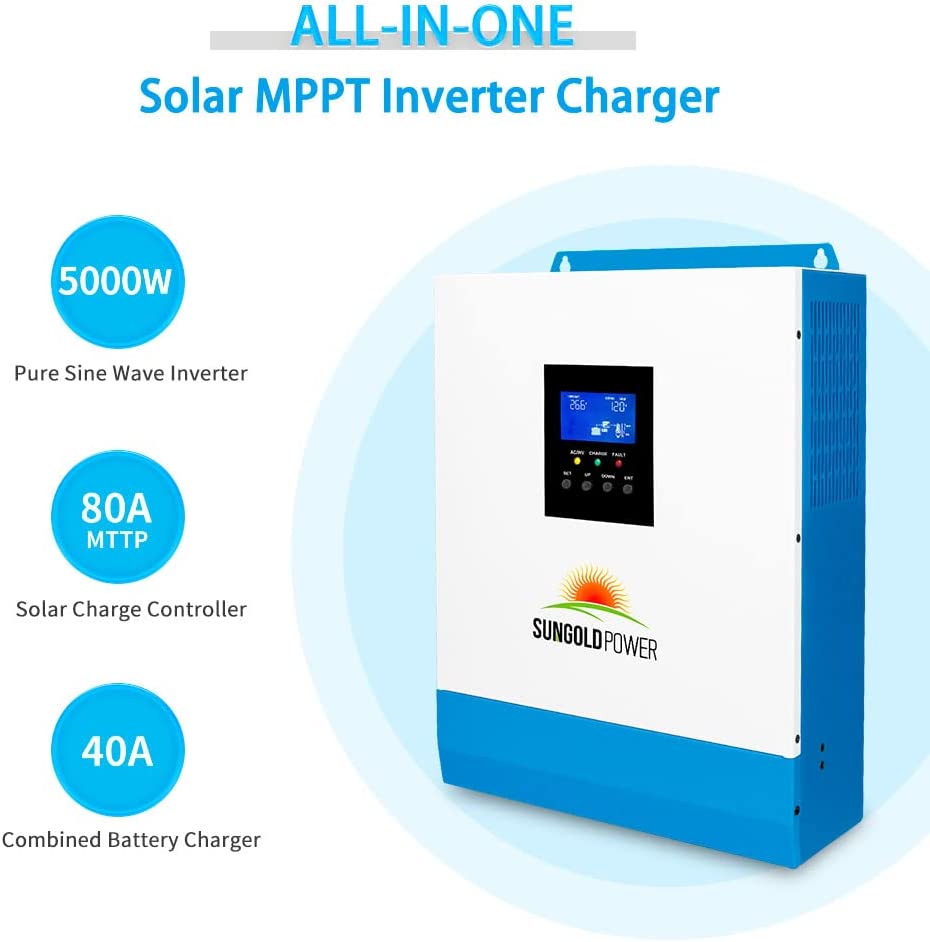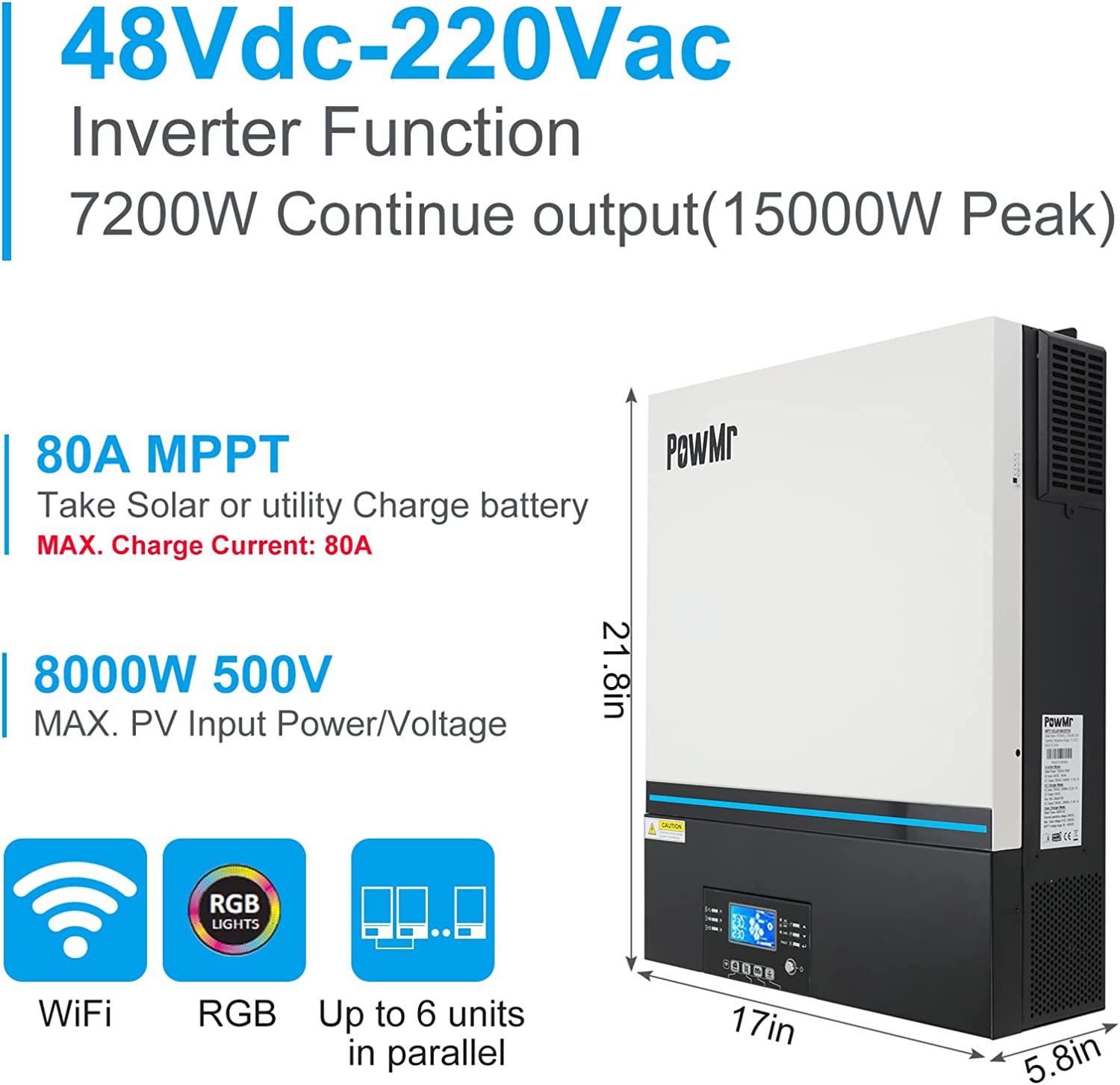After reading through our best solar panels guide, you may have decided that a hybrid inverter is the right choice for your home. These systems are typically more costly than non-hybrid alternatives, but they offer higher efficiency and better reliability, as well as the ability to use power from the utility grid when your solar panels aren't producing enough energy.
In this article, we'll run you through all of the key features to look out for in a hybrid inverter and show you what to expect if you're on a tight budget or if you want something reliable that will last for years to come. We'll also highlight some of the most highly-rated options from reputable brands so that you can find an option that's suited to your needs and requirements.
If you're unsure about whether investing in a hybrid inverter is worth it, keep reading our buying guide below for all of the information that you need before making a decision.
How We Choose
An Inverter is a device that converts Direct Current (DC) electricity to Alternating Current (AC) electricity. This type of conversion is necessary for devices that run on AC power, but cannot handle the power source's direct current.
To do this, an Inverter takes DC energy from a battery and converts it into AC. The converted energy can then be supplied to household appliances that require AC power.
Hybrid inverters are designed to continuously convert both DC and AC energy into usable form so you can always keep your home running smoothly even when you're away or your battery drains below a critical level. With units like these, you'll never have to worry about your air conditioner suddenly shutting off or leaving food in the fridge go bad while you're gone!
Focket Pure Sine Wave Inverter

The Focket PS-5K Inverter Solar Controller is a great choice for anyone looking to power their home or office with solar power. It features an LCD display that makes it easy to adjust settings, and its PWM technology ensures your devices get the right amount of power.
It also has an inverter mode, so you can run your appliances from the grid if needed. This inverter comes with auto restart while AC is recovering, overload/over temperature/short circuit protection and intelligent battery charging designed to provide optimal battery performance.
The Focket PS-5K Inverter Solar Controller comes with a 48V battery which can be charged using either solar or mains power. It's very lightweight at just 9.5lbs making it easy to transport between locations without compromising on performance.
3000W Solar Hybrid Pure Sine Wave Inverter

The LC Inverter Hybrid 3000W is a great inverter for those who want to power their home with solar power and run other appliances at the same time. The inverter comes with a 60A MPPT charge controller, which means you can use it to charge your car battery as well.
It also has four charging modes which are optional: PV priority, Utility Priority, Hybrid Charging, and Only Solar Charging. This inverter offers four different charging options so you can choose how you want to charge your batteries depending on what you need them for that day.
The LCD setting on this model is configurable via an easy-to-use interface that displays information clearly and concisely. It's worth noting that this inverter only works if your system runs on 110V AC output and not 230V or higher.
SUNGOLDPOWER 5000W Hybrid Solar Inverter

The Sungoldpower 5000W 48V Hybrid Solar Inverter is one of the best solar inverters you can buy. It's a powerful, versatile and easy-to-use device that will work with most battery types to charge them up.
The inverter comes with four charging modes – AC Priority, Solar Priority, Only Solar and Mains & Solar Hybrid Charging – so you can use it as either an AC power source or a solar energy generator at the same time. You can also set up your own custom charging mode using the user mode function if you want to charge other battery types too.
The inverter has LCD/LED dynamic display of system data and operating status along with three output modes – mains priority, PV priority and pure sine wave inverter output for uninterrupted power supply (UPS). There is WiFi/GPRS remote monitoring available as an optional extra cost which allows you to monitor your inverter from anywhere in the world via WiFi or GPRS connection.
8000W Hybrid Off Grid Inverter

The PowMr 8000W Off-Grid Inverter is a great choice for anyone who wants to go off-grid with their solar power. It's one of the most powerful inverters on this list, and it packs in a whopping 8000 watts of pure sine wave output.
This means you can use it to charge your batteries or run your home appliances without any compromise in quality. The fact that it supports lead acid or lithium battery support makes this an ideal inverter if you want to be able to use it as soon as possible, even if you have solar power already.
It also has a very detailed LCD screen which displays voltage, current, system status and remaining battery charge level clearly so you know exactly what's going on at all times. And since it offers both grid and battery charging options there really is no limit to how much energy you can store and use when the sun isn't shining!
Hybrid Inverter FAQs
It can be tough to know which product is the best for your needs.
There are a lot of different products on the market, and it seems like every day there's a new one coming out. With so many options, how do you know which one is right for you? It helps to have some help making your decision easier. That's why we've created this curated list of some of the most Frequently Asked Questions about hybrid inverter air conditioners so that you can make an informed purchase!
Can All Hybrid Inverter Work Without Battery?
Unlike a pure solar panel system, hybrid inverter systems are able to draw power from the grid when your solar panels aren't producing enough energy. A large battery is then used as a back-up source of power in case you have a long period of bad weather. However, if your batteries are truly dead (and not just drained), you won't be able to use your hybrid inverter without battery power.
There's no way around this other than replacing or charging the batteries correctly. If you're in doubt about whether or not your hybrid inverter needs batteries, check with the manufacturer first before using it without battery backup.
Which Is Better Hybrid Or Off-grid Inverter?
Hybrid inverters combine the DC power from batteries with AC power generated by solar panels. Hybrid inverters are suitable for backup applications as they can supply electricity to your home in a grid failure, but also give you the option of exporting excess solar energy back to the grid if you have a net-metering agreement with your utility company.
Off-grid systems typically use batteries as a primary source of electricity, and convert DC battery power into AC through an inverter (either standalone or built into the battery). Off-grid systems usually provide enough power for basic household needs, but may not be suitable for high energy usage appliances like refrigerators or ovens.
How Long Do Hybrid Inverters Last?
The lifespan of a hybrid inverter is hard to predict, as it depends on usage and the job that the air conditioner has to do. A top-of-the-range model will cost thousands of dollars when you buy it, but even then, it may only last for a few years. Some models promise long term warranties on their products, with coverage stretching up to 15 years.
Generally speaking though, we'd say that a good standard should be around 7 or 8 years in total before needing replacement or repair work done. Inverters have become more reliable over time though thanks to innovation and technology changes from AC manufacturers like Lennox.
Can You Use A Hybrid Inverter For Off-grid?
Yes, you can use a hybrid inverter for off-grid solar power if you have the proper battery pack. We recommend getting a deep cycle marine battery to run your hybrid inverter (as well as the rest of your appliances). Make sure it's properly sized and that you shut off any unused circuits to avoid overcharging.
Hybrid inverters are less popular than grid-tied systems because they're more expensive and work best when paired with batteries and DC appliances. But if you live in an area where there is no reliable grid service or you want to be prepared for power outages, a hybrid inverter can still be worth the investment. You'll need to do some research on sizing your system based on how much power your household uses each day, but once it's set up, a hybrid system will function similarly to an off-the-grid solar array with batteries.
Can You Go Off-grid With Hybrid Inverter?
The short answer is yes, but there are caveats. Most hybrid inverters include a backup battery so you can still power your refrigerator and lights for a few hours after the grid goes down. However, these batteries are typically smaller than those used in traditional back-up systems and will last only about four to six hours. If you plan on being off-grid for an extended period of time, such as following a natural disaster, make sure you purchase an appropriate sized battery that will extend your off-grid time. Another important consideration when going off-grid with hybrid inverter is managing your energy usage while disconnected from the grid. This may require investing in energy efficient appliances or using products like smart plugs to automatically shut off devices that aren't essential to preserving battery life until you can get back online again.
What Are The Disadvantages Of Hybrid Power System?
While hybrid vehicles are generally more fuel efficient than non-hybrid systems, they do have a few disadvantages. One of the biggest issues is price. While you can find many good deals on used hybrid cars, they often cost significantly more than their non-hybrid counterparts. Hybrids also tend to be heavier and have lower gas mileage compared to battery electric vehicles (BEVs). Hybrids require gasoline as well as electricity from their batteries, so if your battery runs out of power while driving, your vehicle will continue running on gasoline only until you come to a complete stop.
The emissions produced by hybrids are also considered “better” but not cleaner than those produced by non-hybrid vehicles because hybrids still run on an internal combustion engine (ICE), which is typically much dirtier than a battery or hydrogen fuel cell. Finally, because hybrids are technically still gas/diesel powered cars, they won't receive the same tax credits or incentives that full-electric vehicles do.
When Should You Use A Hybrid Inverter?
A hybrid inverter is great if you want the flexibility of a gas or electric range but don't have the budget for a high-end designer appliance. Hybrids tend to be cheaper than standard electric ranges and far more affordable than designer gas cooktops.
They can also be useful if you have limited space in your kitchen; while they're not as compact as regular electric models, they're much smaller than freestanding gas cookers.
Hybrids are ideal for smaller families and those who like to entertain occasionally but don't need something that can handle large crowds on a regular basis. They're also good choices if you live in an area with cold winters and want the option of using an electric burner when it's freezing outside.
What Are The Advantages Of Hybrid Inverters?
Hybrid inverters are a combination of two technologies: pure DC micro-inverters and central inverters. As the name suggests, micro-inverters are smaller versions of regular central inverters and can be installed on each panel. They monitor the performance of each panel individually to ensure that it is operating at its optimum level and produce DC power rather than AC power.
However, micro-inverters have some inherent disadvantages too. For instance, they add extra cost to your solar energy system because you need to purchase separate inverter units for every panel. Also, if one fails then the entire system stops working until it is repaired – which could be quite time-consuming depending on where exactly in your home they're located.
Hybrid inverters solve most of these problems by combining elements from both types of systems into one package. They run off your regular household grid connection so there's no additional cost associated with them like there is with micro-inverters; they also don't require special installations like battery systems do either as they fit right inside your existing fuse box (a standard electrical box found in almost all homes). And finally, hybrid systems use a combiner box that allows you to combine several panels together so you get more wattage overall but still retain individual monitoring for each panel too if needed (which isn't possible with standard central inverter systems).
What Is The Disadvantage Of Hybrid Inverter?
Hybrid inverters are a compromise. They are essentially standard grid tie inverters that have been modified to include battery charging functionality. Their design means they aren't as efficient at either solar PV or battery charging, and their battery charging phases can damage the longevity of a system's batteries by forcing them to cycle through extreme high and low voltages.
Hybrid inverters also typically don't have the same smart features or processing power as dedicated DC optimizers, so you may not get optimal performance in other facets of your system when compared to a pure grid tie inverter.
What Does A Hybrid Inverter Do?
When you're using an appliance, it's running on either the grid power you get from your local utility company or your battery backup. A hybrid inverter is a type of device that allows you to run your appliances on both sources of power at the same time. You can also use a hybrid inverter to draw electricity directly from the grid; however, this may be more expensive than drawing energy from your batteries unless there is an emergency and you need immediate access to electricity.
Hybrid inverters are fairly new technology. They were introduced in about 2010 and have been gaining popularity ever since. As of 2018, they are considered by many experts to be one of the best solutions for home backup systems because they allow homeowners to minimize their reliance on grid power while still having back up protection against blackouts.
Conclusion
Hybrid inverter technology combines the best of DC and AC power to offer customers an efficient, reliable, and cost-friendly solution. This type of system has been shown to have lower operating costs than traditional AC or DC systems alone. Additionally, hybrid inverters operate more quietly than traditional models because they don't need a separate motor or generator. Their digital controls also allow users to customize their energy usage based on their specific needs. All in all, if you're looking for the most versatile and efficient way to generate electricity from your solar panels then hybrid inverter technology should be high on your list of considerations.









